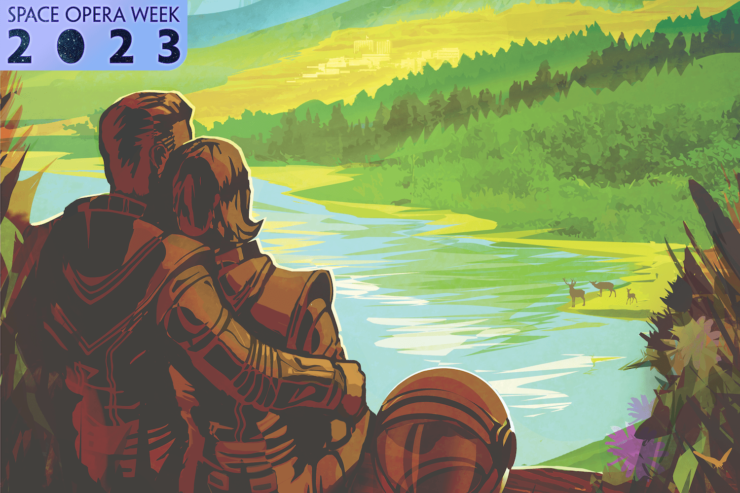Many space operas depict an all-conquering humanity, dominating the local region or even the galaxy as a whole. Others feature humans vastly outmatched by galactic powers, a world for whom first contact was synonymous with being conquered. This doesn’t seem unreasonable: Terran technological civilization is young, while galactic cultures could have been around far longer. Just the fact that other civilizations can cross light-years suggests they have access to technology of which we can only dream.
There is a silver lining in this particular cloud. It is much easier to be a freedom fighter if there’s an empire from which to free oneself. The authors of these five Reagan-era works might agree.
Other Suns by Niall Shapero (1983)
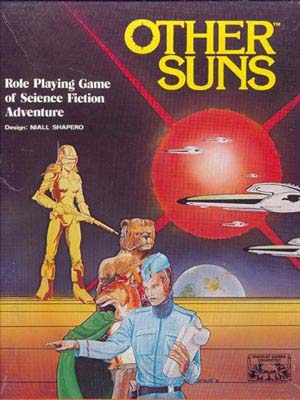
A tabletop roleplaying game.
Backstory: having survived nuclear war, unified under the Terran Empire, and developed faster-than-light drives, humanity was astonished to discover an ancient and highly advanced alien civilization spanning a third of the galaxy. The Terran Empire immediately set out to prove human supremacy by conquering the L’Doran Hegemony. Abject failure inspired the Terrans to try again.
By the era in which this vintage tabletop roleplaying game is set, galactic civilization has largely recovered from the failed barbarian invasion, radioactive Earth glows pleasantly, and members of the human diaspora live under governments dominated by species not inclined to set the galaxy aflame. The Hegemony isn’t a terrible place to live, but there’s nothing in the game forbidding humans from trying their hand at overthrowing it. Well, except for established law and the combined legal and military might of an ancient, galactic-scale government.
The real barrier to playing human freedom fighter/terrorist is that Other Suns offered a wide range of furry aliens one could play. Most seem more interesting than playing as humans.
“Bloodchild” by Octavia E. Butler (1984)

Many cultures, encountering refugees, offer no comfort, only cold orders to move on. Encountering humans fleeing from other humans, the Tlic graciously provided the refugees with protection and new homes on a carefully monitored and sequestered Preserve. They even graced some humans with the opportunity to play an important role in Tlic society, as hosts for Tlic eggs.
Unlike most parasitoid aliens, the Tlic are not cruel or indifferent to host discomfort. They do their best to ensure the host’s health while making the entire process as pleasant as possible. This means very little to Gan, a young man not at all convinced he is willing to host alien young. Not that the Tlic really offer Gan a choice in the matter.
It’s kind of odd that alien and human biology are compatible enough for us to play aphid to their Aphidiinae wasp. Readers unfamiliar with Butler could do worse than to begin with this multi-award-winning novelette, which demonstrates nicely a circumstance frequently encountered in Butler stories: someone making the best deal possible while negotiating from a position of extreme disadvantage.
Starhammer by Christopher Rowley (1986)
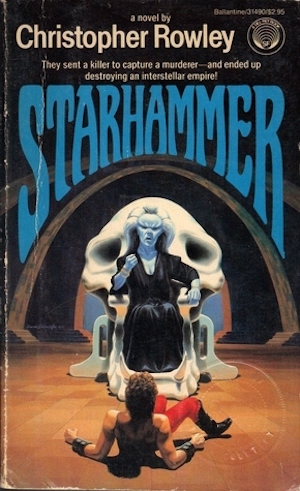
A thousand years after humans began venturing out in sublight starships, humans encountered the Laowon. The alien realm was vastly larger than human space, on top of which the Laowon possessed faster-than-light drives. Humanity was swiftly reduced to a subjugated species, exploited and abused according to Laowon whim.
Fifteen centuries later, there are still humans who dream of freedom. Hope appears in the form of the Starhammer, an ancient weapon whose name is not hyperbole. If an ambitious human can locate this relic of a long-vanished civilization, humanity might be liberated. Or perhaps, humanity will fall to a conqueror more terrible than the Laowon.
There’s always a catch to devices like the Starhammer, Foster’s The Tar-Aiym Krang, and Corey’s protomolecule; the catch is often (but not always) that Ultimate Weapons are designed to deal with Ultimate Enemies. Just because the civilization that built the Ultimate Weapon is long gone does not mean the Ultimate Enemy went away.
The Crown Jewels by Walter Jon Williams (1987)
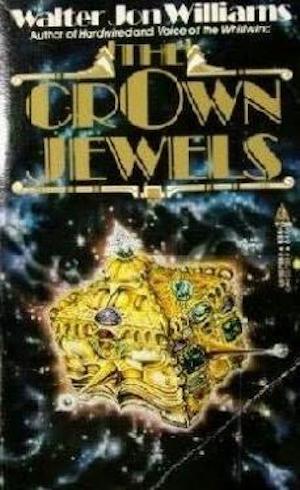
Khosali conquest of Earth took approximately as long as it would take to leisurely drink a cup of tea. Humans became just another subjugated race, its barbarous ways replaced by high culture, with suitably obsequious humans elevated to lesser nobility. The Khosali even appropriated certain colorful elements from Earth: Long live the cult of Elvis!
Khosali dynastic crisis allowed humans to establish their own government, one that followed the forms and customs of their former masters. Among said customs, the Allowed Burglar. Inspired by a kleptomaniac emperor, Allowed Burglars may purloin treasures…provided they do it with style. Allowed Burglar Drake Maijistral is capable and ambitious; also, as he discovers the hard way, unlucky enough to find that there are some treasures it’s best not to steal.
The Drake Maijistral books are, like the Anthony Villiers books to which they appear to be cousins, comedies. Alas, many SF readers are completely humorless (it is probably best not to mention a particularly humorless example by name) and the series did not prosper as much as it should have. Nevertheless, the Maijistral books are worth hunting down.
The Empress of Earth by Melissa Scott (1987)
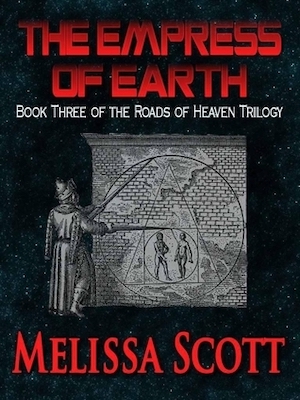
Star-pilot-turned-magus Silence Leigh elevated Adeban to Hegemon when she helped topple his predecessor. Adeban’s gratitude is matched only by his awareness that to publicly acknowledge his debt to a woman would be a fatal misstep in a society as relentlessly patriarchal as the Hegemony. Nevertheless, Adeban is a munificent if secretive patron, who sees in Silence and her husbands’ quest to reach long sequestered Earth a way to increase his son’s status.
Adeban’s son is left behind. Instead, the Hegemon’s daughter Aili stows away. The expedition succeeds in reaching Earth, only to discover that the political situation there is far more complex than they knew. Worst of all, while Silence and company may succeed in loosening the Rose World’s grasp on Earth, the cost may be replacing it with Hegemonic conquest.
***
Not every galactic power to set covetous eyes on Earth will be alien. In fact, the odds might favour human conquerors, being adapted as they are to terrestrial conditions. The great-great-grandkids of today’s stellar pioneers could be tomorrow’s invaders from the stars!
Of course, the theme of humans faced with unwillingly incorporation into galactic societies of varying degrees of unpleasantness is a very popular one. I could not begin to list them all and have not tried. Heinlein’s oeuvre alone includes a number of such narratives, but, as you know Bob, I won’t mention them here. If you feel I’ve overlooked noteworthy examples, feel free to mention them in comments, which are, as ever, below.
In the words of fanfiction author Musty181, four-time Hugo finalist, prolific book reviewer, and perennial Darwin Award nominee James Davis Nicoll “looks like a default mii with glasses.” His work has appeared in Interzone, Publishers Weekly and Romantic Times as well as on his own websites, James Nicoll Reviews (where he is assisted by editor Karen Lofstrom and web person Adrienne L. Travis) and the 2021 and 2022 Aurora Award finalist Young People Read Old SFF (where he is assisted by web person Adrienne L. Travis). His Patreon can be found here.










